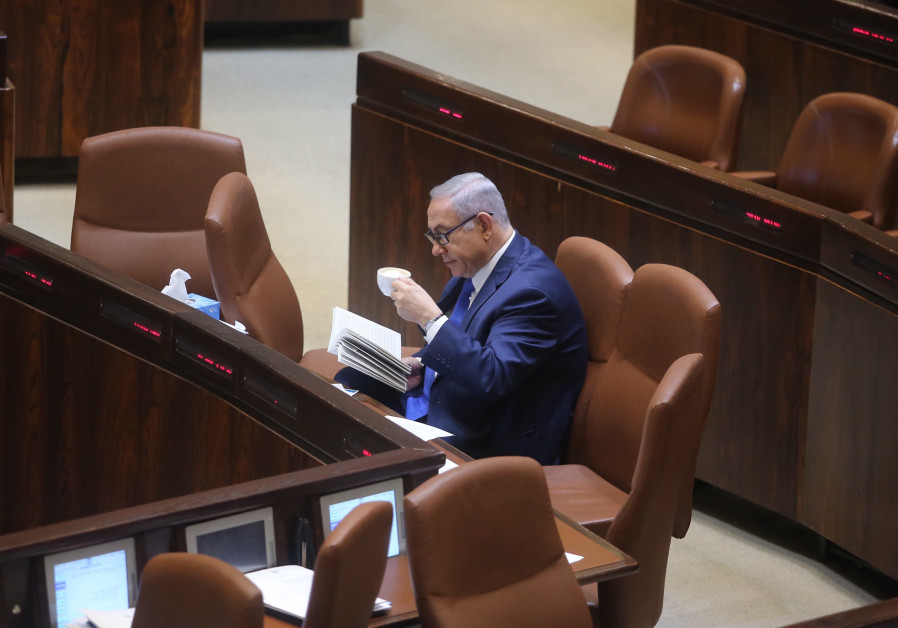Haredi conscription has been an impossible political puzzle, and the coalition didn’t quite solve it last night.

During the last few weeks’ political turmoil, a lot of sports metaphors were thrown around. The ball was in this one’s or that one’s court to end the coalition crisis. And now that an election wasn’t called this week, the headlines would have you believe that the proverbial ball disappeared.
Actually, the ball has just rolled a little farther away.
Haredi conscription has been an intractable political issue for so long that it’s hard to believe that it was really resolved last night.
And it wasn’t.
The crisis ended with an agreement among the coalition parties by which the Ministerial Committee for Legislation would allow each of them to decide how they would vote on the haredi conscription bill proposed by Shas MK Yoav Ben-Tzur in a preliminary reading held Tuesday night. Then, as expected, every coalition party except Yisrael Beytenu decided to vote in favor of the bill. This workaround allowed Aliya and Integration Minister Sofa Landver to vote against the bill, without Prime Minister Benjamin Netanyahu firing her, as is the custom when a minister votes against the government.
The next part of the deal to avoid an early election is that the Defense Ministry committee charged with working on a draft bill for haredi conscription would present its proposal to the ministers by the end of May. After the two draft bills pass a first reading, they will be merged, and the result must be agreed upon by the heads of haredi parties and Defense Minister Avigdor Liberman, before it goes to a final vote.
Other pieces of the deal are that the coalition parties will avoid proposing new religion and state bills, and will try to keep the coalition stable “over time,” the amount of time not being specified, though the government’s term ends in November 2019.
This is all very well, and the coalition partners are quietly celebrating that they were able to back Netanyahu into a corner so he wouldn’t call an early election, but actually all this is doing is postponing the inevitable.
The key is that sometime this summer Shas and United Torah Judaism and Liberman will have to agree on a haredi conscription bill.
The bill that the coalition approved Tuesday night sets binding targets for haredi conscription, which would be reviewed every year or two, and if they are not met, the government has the option of voiding the law, or passing a new one to continue haredi draft exemptions.
Liberman says he and his Yisrael Beytenu party will support only a conscription bill that has the backing and input of the Defense Ministry.
Experience shows us that bridging the two sides may not be easy.
In 2012, the High Court struck down the “Tal Law,” which upheld the broad exemption for young haredi men from military or civilian national service. At the time, like now, Shas and UTJ were in a Netanyahu-led government.
A few months later, when the coalition looked like it was about to break up because there was no agreement on how to handle the issue, and the bill to disperse the Knesset already passed a first reading, Kadima swooped in to form a national unity coalition.
Then-Kadima MK Yohanan Plesner led a committee of MKs and public representatives that met for several months. Its recommendations led to disputes within the coalition, Netanyahu dissolved the committee, the coalition crisis got worse, and the country went to an election.
After the 2013 election, a new Netanyahu government was formed with Yesh Atid and without the haredim. Justice Minister Ayelet Shaked, then a freshman MK from Bayit Yehudi, led yet another committee to pass a haredi conscription bill, which set conscription targets for a few years down the line, along with criminal sanctions for draft dodgers. The bill passed in 2014, but there was an election 10 months later, and the new coalition had Shas and UTJ in it, while Yesh Atid was and still is in the opposition. The current government mostly canceled the law in 2015.
In September 2016, the High Court said the government’s policy on haredi conscription exemptions was discriminatory and gave it a year to come up with a new one, and that is what brought along the coalition crisis.
It’s hard not to be skeptical that Liberman, who wants not only haredim to have to serve, but Israeli Arabs as well, will be able to come to an agreement with Shas and UTJ.
And if those two sides can’t agree, another coalition crisis will likely crop up.
THERE IS, however, an alternative theory. Education Minister Naftali Bennett brought it up on Monday, haredi journalists and political advisers have been talking about it in the Knesset, and an article in Yediot Aharonot Wednesday said it’s on top IDF officers’ minds as well.
That theory is that the IDF can’t handle thousands of haredi draftees. As it is, the ones who are already serving in the IDF demand to be keep women away, and as Bennett put it, they have “17 different kosher certifications” that the IDF would have to make sure its food gets.
There have already been issues with a minority of religious-Zionist soldiers that have become national scandals: soldiers walking out when women sing, male soldiers who don’t want to serve in the same tank as a female soldier.
Wouldn’t that get even worse with an influx of ultra-Orthodox soldiers?
At this point, we don’t know whether history will repeat itself, or if the Defense Ministry will come up with an offer the haredi parties – and more importantly their three councils of Torah sages – will snap up.
Either way, the ball will be back in play this summer.
As reported by The Jerusalem Post
